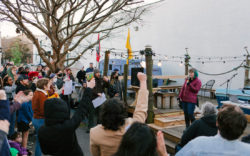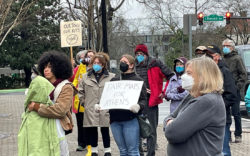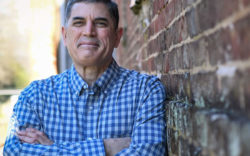Two members of the Russian punk band Pussy Riot remain behind bars following their actions in protest of Vladimir Putin’s ever-lengthening rule of the Russian Federation. As part of a wave of protests ahead of the March reelection of Putin, the band and feminist collective performed, without permission, their agitprop anti-Putin anthem “Punk Prayer†inside a prominent Moscow cathedral. A video available on YouTube shows the colorfully masked women singing, “Saint Mary, Virgin, become a feminist and drive away Putin,†as the authorities drag them into custody. Two of the women face up to seven years for the charge of “hooliganism.â€
A wave of international solidarity has sprung up in the wake of the detentions, even joined locally by Athens band Reptarz2, who closed a recent show at Flicker with the unfurling of a banner reading “Free Pussy Riot!†The Free Pussy Riot Facebook page features similar demonstrations of support from across the globe.
The band’s trial is only the latest cause célèbre in what’s becoming a worldwide coordination and communication of protests and uprisings, starting with the Arab Spring and Mediterranean austerity protests and spilling into wider Europe, the United States, Latin America and parts of Asia. And the Putin government’s reaction represents the sort of out-of-proportion response found nearly everywhere protests have broken out.
As the stakes get higher, it appears that governments are increasingly prepared to use the powers at their disposal—military and legal—to stamp out dissent. Last month, Blackhawk helicopters could be seen performing military exercises over downtown Chicago in preparation for Occupy-type protests at next month’s NATO summit. In anticipation of protests at September’s Democratic Party Convention, the Charlotte city council voted to designate certain events as “extraordinary,†where police could all but disregard the Fourth Amendment and search and frisk anyone deemed suspicious. Unsurprisingly, it will be a Bank of America shareholders’ meeting that is first designated as an “extraordinary event,†during which the Constitution is held behind a cordon.
In March, President Obama signed into law anti-protest legislation that creates nebulous and roving spaces with special laws similar to Charlotte’s. Updating an older, more narrow law, the new bill declares that any space overseen by the Secret Service is subject to different laws, different interpretations of the Constitution than those observed everywhere else in the country. An attempt to “impede or disrupt the orderly conduct of Government business or official functionsâ€â€”an Occupy “mic check,†for instance—can be prosecuted as a federal offense, punishable by up to 10 years in prison. But as legal writer Dahlia Lithwick points out, Secret Service-protected National Special Security Events are not limited to presidential functions, but can include such “special†events as some basketball games and concerts. The floating boundaries mean that protesters might not know where their First Amendment rights end and where imprisonment begins.
It is right here in Georgia, of all places, that we might find some hope. A recent General Assembly bill limiting the rights of union members was struck down after Labor aligned with Occupy and the Tea Party in opposition to the legislation. Drafted by the state Chamber of Commerce, SB 469 targeted union protests at places of residence, while excluding other groups (such as anti-abortion activists, whose tactics still include assassinations and fire bombs). The bill was sponsored by four American Legislative Exchange Council legislators, including your local ALEC lackey, Sen. Bill Cowsert.
Despite the decidedly conservative bent of the bill, the Georgia Tea Party Patriots joined the opposition, citing the bill’s impingement of First Amendment rights. Republic Report’s Zaid Jilani reminds us that it was the activists of the original Tea Party generation, Samuel Adams’ Sons of Liberty, who “regularly protested outside of the homes of British colonial officials†and might have fallen into the purview of the proposed law. Debbie Dooley, a national Tea Party Patriots official, roused Teamsters and other union members to a standing ovation at the legislative hearing as she decried the “assault on our First Amendment rights.†As governments around the world continue to sharpen their tools in defense of the elite, it will take more scenes like this one—coalitional and multitudinous—to maintain and expand democracy.
Like what you just read? Support Flagpole by making a donation today. Every dollar you give helps fund our ongoing mission to provide Athens with quality, independent journalism.










